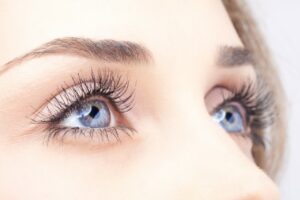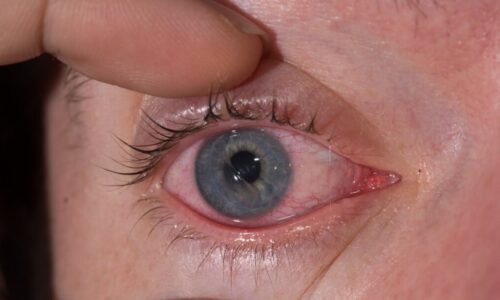Why does my eyelid twitch? |

Eye twitching, or blepharospasm, is a condition that generates a number of questions among our clients. “Blepharo” means eyelid and “spasm” refers to an uncontrolled muscle contraction. There are benign as well as serious causes of blepharospasm. Today’s Health Tip will look at the two most common types.
Simple Eyelid Twitch
Typically, with a simple eyelid twitch, the upper lid blinks and you can’t make it stop. Usually, this affects only one eye with the lid twitching every few seconds. This is the most common and least serious type of blepharospasm. Although there is no definite cause, its occurrence seems to be associated with fatigue, stress, lack of sleep and use of alcohol, tobacco or caffeine. Once these spasms begin, they may continue off and on for a few days and then disappear as quickly as they began. People who experience this find it very annoying and in some cases frightening. This type of eyelid twitching requires no treatment although getting plenty of rest, and reducing stress and caffeine consumption seems to help.
Benign Essential Blepharospasm (BEB)
A second, much less common type of eyelid twitching is called Benign Essential Blepharospasm (BEB). “Benign” indicates the condition is not life threatening and “essential” is a medical term meaning “of unknown cause.” It is estimated that there are at least 50,000 cases of blepharospasm in the United States, with up to 2000 new cases diagnosed annually. This type of blepharospasm usually involves both eyes, causing the eyelids to close involuntarily. In BEB, abnormal nerve impulses develop in a vicious cycle, producing the spasms. BEB may also be seen in those with conditions that result in irritation of the surface of the eye (cornea) or the membranes lining the eyelids (conjunctiva). This type of blepharospasm may become a chronic, progressively worsening process, and can even become incapacitating.
In most cases, doctors are able to diagnose BEB from the clinical appearance of the patient. There are no laboratory or imaging studies that are specific to the condition. Since light sensitivity is a common trigger for BEB, one of the treatment measures involves the use of tinted glasses to block ultraviolet rays. For mild cases, medications may be tried initially. Drugs with the highest percentages of favorable patient responses include the tranquilizer lorazepam and Artane, a medication used in the treatment of Parkinson’s disease.
Botulinum (BOTOX®) injections have now become the most commonly recommended treatment for BEB with up to 95% of patients reporting significant improvement. Injection in very small quantities into the muscles around the eyes will relax the spasm. The injection works for several months, but will slowly wear off and usually needs to be repeated. In patients who do receive adequate relief of their spasms with BOTOX® injections, surgical intervention may be considered. Surgical treatment for BEB involves severing the involved muscles around the eye.
When Should I See a Doctor? As mentioned, most cases of eyelid twitching are benign and related to lifestyle issues such as fatigue and caffeine consumption. Reasons to consult a physician include: 1) twitching lasting longer than a week, 2) spasm involving other facial muscles, 3) drooping of the eyelid, and 4) redness, swelling or discharge from the eye.
Sources for article:
Eyelid Spasms from Kellogg Eye Center, University of Michigan
Eye twitching from Mayo Foundation for Medical Education and Research
Eyelid twitch from Medline Plus
If you have any more questions just Ask Hanna, our health advisors are here to help.
Image: ©Shutterstock / Serg Zastavkin








